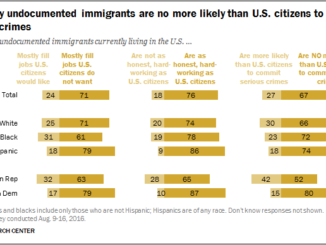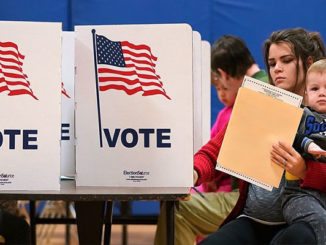
The recent surge of immigrants at the border is sure to make immigration a more central theme in the general election.
by Gabriel R. Sanchez
Recently, passage of a highly anticipated bipartisan immigration and foreign aid bill was killed by former President Trump, a fierce opponent of a border deal who lobbied Republicans to vote against the bill even though it contained many items that they initially supported. Even Senate Minority Leader Mitch McConnell bowed to Trump’s wishes and voted against it despite leading the development of the legislation and garnering support for it within his party.
Although it is unclear how much impact the collapse of the immigration bill will have on voting behavior, Biden will have an opportunity to leverage this issue to make some inroads with voters hungry to see action taken at the border. Biden and Democratic congressional candidates will likely hammer home the message that Trump and fellow Republicans stood in the way of action being taken at the border. Biden signaled this strategy when he stated that:
“All indications are this bill won’t even move forward to the Senate floor. Why? The simple reason: Donald Trump,” and, “I’ll be taking this issue to the country and the voters are going to know that…just at the moment we’re going to secure the border and fund these other programs Trump and the MAGA Republicans said no because they’re afraid of Donald Trump.”
With sagging approval ratings, Biden will need to make the most of this bill’s failure to resonate with voters for whom immigration is a top priority. In fact, Gallup’s polling in January found that when voters who disapprove of Biden’s job performance were asked to explain their reasoning, open borders/illegal immigration was the most commonly cited issue at 19%.
Will Trump’s role in the failure of the immigration bill shift voter’s attitudes?
If Biden’s campaign can make a strong case to voters that the lack of movement on action at the border is not a result of his failures but due to a Republican-led Congress choosing to take orders from Trump because of his election prospects, it could be the game-changer Biden is looking for. With only four Republicans standing against Trump and voting for the bill, this should be a relatively easy message to convey to the public.
Immigration has not been a top priority for voters of late, including during the 2022 election when national polls showed that small percentages of voters stated that protecting immigrant rights (seven percent) or border security (16%) were some of the most important issues for Congress and the president to address. Immigration trailed behind other issues, including inflation, abortion, the cost of health care, and crime, among others.
However, the recent surge of immigrants at the border is sure to make immigration a more central theme in the general election. The Biden administration is likely to unveil a series of executive actions focused on border enforcement along the U.S. southern border. This will bring immigration into the spotlight of the national media and help Biden reframe the issue, shifting accountability to Republicans for standing in the way of legislation that would repair our broken immigration system.
The Trump campaign is obviously no stranger to mobilizing voters through tough talk on border enforcement and villainizing immigrants. He has made clear that he intends to make immigration a core theme in his campaign with an emphasis on deportation. He has promised, if elected, to launch “the largest domestic deportation operation in American history,” utilizing the military to round up undocumented immigrants in large-scale deportation camps. The Trump plan is modeled after the infamous “Operation Wetback” campaign initiated by Eisenhower, which led to the deportation of many Latino U.S. citizens. In fact, Trump’s justification for killing the bipartisan bill is that it is not harsh enough: “I do not think we should do a Border Deal, at all, unless we get EVERYTHING needed to shut down the INVASION of Millions & Millions of people.”
While this plan and the inflammatory messaging that will come with it will surely increase enthusiasm among Trump’s base, it also has the potential to mobilize voters who take offense to the rhetoric. This will include Latino voters, a sub-group of the electorate who will be vital to the outcome of the 2024 presidential election. I have argued in prior posts that Democratic candidates perform better with Latino voters when immigration is salient, particularly when their ethnic identity is fueled by anti-Latino and immigrant campaign rhetoric. If Trump reverts back to the inflammatory language he used to push for his immigration policies during the 2016 campaign, it could bode well for Biden and Democrats.
Immigration was projected to be a salient issue for the Latino electorate even before the failure of the recent immigration bill, with one-fifth (20%) of Latino voters reporting that “immigration and the border” is one of the most important issues for elected officials to address in a UnidosUS national poll conducted in late 2023. If immigration emerges as a central theme during the general election, the percentage of Latino voters for whom immigration is a top voting priority will undoubtedly surge.
More than just border enforcement will be needed to court Latino and Black voters
The immigration and foreign aid bill would have gone a long way to address voters’ concerns regarding border enforcement, as it provided $20.23 billion to increase border security and change current migrant policies. This includes the eight percent of Latino voters who identified border security as one of their top issue priorities in the UnidosUS National Latino Survey from last November.1 However, the bill did not outline a pathway to legal status for undocumented immigrants, a policy that has much wider support among these two sub-groups of the larger electorate.
Both Biden and Trump will need to address border security alongside a pathway to legal status for immigrants already in the United States in order to appeal to the majority of Latino voters. Nearly half (47%) of the sample in this poll support a dual strategy of bolstering border security while concurrently establishing a pathway to legal status for undocumented immigrants who have long resided in and contributed to the United States, in contrast to the mere 15% who prioritize border security alone.
Immigration may also help Democrats’ goal of generating more enthusiasm among Black voters, a key sub-group of the Democratic base that tends to have even more progressive attitudes about immigration policy than Latino voters. Nationally, as of March 2023, 60% of Black voters approved of how Biden was handling immigration, which was higher than any other race or ethnicity, surpassing even Latino voters.2 Furthermore, the vast majority (77%) of Black voters express confidence in Biden and Democrats to effectively address immigration challenges, compared to only 15% for Republicans.
After two elections (2022 and 2020) where the economy and/or COVID-19 drowned out the impact of immigration policy on voting behavior, we may see immigration returning to the forefront of voters’ minds as it did for the Obama election years of 2008 and 2012. If this happens, it is likely that the candidate who can signal to voters that they have a plan to simultaneously address border security while developing approaches to help find a path to legal status for undocumented immigrants will be rewarded with the opportunity to implement that plan as our next president.
Gabriel R. Sanchez, Ph.D., is a senior fellow in Governance Studies at Brookings. Sanchez is a professor of political science and the Founding Robert Wood Johnson Foundation Endowed Chair in Health Policy at the University of New Mexico.



